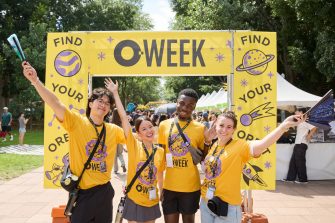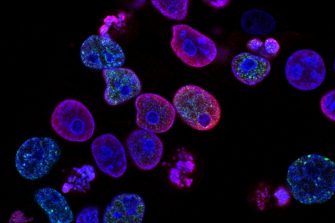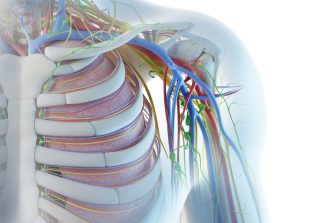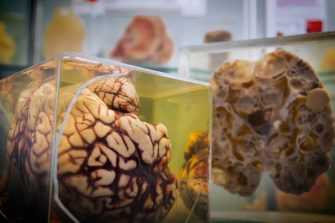
Welcome to the Bachelor of Medical Science! In this degree you will learn how the body works and responds to disease and treatments. The range of majors offered will prepare you for a diversity of careers including biomedical research, health policy and regulation, pharmaceutical and biotech industry, and health professions. We're thrilled to have you!
How your degree works
Major
Students may elect to complete a Major, or a double Major, from the nine available Major options. Where a student would like to graduate with a Major (this is not a compulsory part of the program) this must be declared by the commencement of a student’s final year of study. Note: if a student chooses two Majors, no double-counting of courses is allowed at level 3.
Information on available Majors can be found at the bottom of this page.
Science Electives
Students must take 6 UOC from the Faculty of Science (Psychology, Physics or Mathematics courses are recommended).
Electives
These are courses that you can choose to take from any subject area, giving you the opportunity to explore topics outside of your science major.
General Education
At USNW, you need to take at least 12 UOC outside your faculty to broaden your education. Any course defined as Science or Medicine cannot be taken as General Education along with courses starting with GENS, GENM, FOOD and COMP. More information on General Education found here.
Units of Credit (UOC)
A UOC helps measure how much you learn in a course and program. Most courses are 6 UOC. As a full-time student, you’ll usually do 12-18 UOC each term. For more info, check our Unit of Credit Details.
Discipline Core – Core Courses and Prescribed Electives
These are courses you must pass to get your qualification. Core courses are mandatory and specific, while prescribed electives are mandatory but let you choose from a list. In a Bachelor of Medical Science, there are core and prescribed electives that all students must take.
Discipline Component
Students must complete 120 UOC of the following to satisfy the core requirements of this degree:
42 UOC from Level 1 Core Courses
48 UOC from Level 2 Core Courses
24 UOC from Level 3 Prescribed Electives
6 UOC from a Science Elective.
Understanding Your Program
Program Overview
The Medical Science program is a three-year degree jointly taught by the Faculty of Medicine & Health and the Faculty of Science. Students will study key areas such as Cell and Molecular Biology, Biochemistry, Anatomy, Physiology, Pathology, Microbiology, Pharmacology, Genetics, Immunology, and Neuroscience. By examining the structure and function of the human body, disease processes, and therapeutic interventions, the program equips graduates with a deep understanding of human health and disease. With opportunities for hands-on learning and research, this degree is the perfect pathway for careers in, biomedical research, health policy and regulation, pharmaceutical and biotech industry, and health professions. Students may also pursue an Honours degree for advanced research opportunities.
Your First Year
In the first year, students are introduced to foundational concepts in science and human biology that provide the basis for more advanced study. Core courses include biology, chemistry, anatomy, and maths, where students build essential scientific knowledge, analytical skills and develop foundational lab skills. Through a mix of lectures, laboratory sessions, and tutorials, first-year students gain the skills and knowledge necessary to succeed in the program's more specialised second and third years.
Planning Your First Year
Starting university is a big transition, and your course structure can help set you up for success. You may want to consider the following options when enrolling in courses during your first year based on your goals and confidence:
Option 1: Ease into it
Why: This lighter start gives you time to adjust to university life, explore effective study habits, and settle into your new routine.
Next Steps: Increase your workload in later terms as you gain confidence and momentum.
Option 2: Balanced
- Take three courses in Terms 1 and 2, followed by two courses in Term 3 for a lighter end-of-year workload.
Why: This approach allows you to focus on building a strong foundation early while giving yourself more breathing room later in the year for exams, projects, or other priorities
Option 3: Ambitious
Enrol in three courses per term across all three terms for a steady and challenging pace.
Why: For students eager to dive in and stay consistent, even though this workload is higher than expected for first-year students.
Selecting A Major
Orientation Content

O-Week
In the week leading up to the start of the term, UNSW buzzes with a range of events aimed at helping new students become familiar with the university's campus, it's unique culture, and the available services. It's an opportunity to find your comfort zone before embarking on your academic journey.
During O-Week, you can expect:
- Faculty Welcome: Start your journey with a warm welcome to your academic department, setting the stage for your studies.
- Campus Tours: Explore the campus through guided tours to get acquainted with your new surroundings.
- Club Sign- Ups: Discover a wide range of clubs and societies to join and meet like-minded peers through Arc.
- Workshops: Participate in informative workshops to gain valuable skills and knowledge.
- Social Events: AS the day turns into evening, enjoy social gatherings where you can make friends and experience the vubrant social scene of UNSW.
UNSW's O-Week is the perfect opportunity to ease into university life and make connections that will enrich your academic experience.
Clubs & Societies
At UNSW, there is an abundence of student-led clubs and societies, all of which are open for memebership. This presents a fantastic opportunity to explore new interests, become a valued member of a thriving community, and forge connections with individuals who share your passions.
Other benefits of joining Arc:
- Volunteering & paid opportunities
- Legal advice for students
- Food hub - free food packs for students
- International student support
- Student noticeboards
- Gigs & events for students

UNSW Expectations of You
At UNSW, we're dedicated to enhancing your student experience. As a student, we encourage you to find the right balance in your workload, enabling both academic achievement and personal growth. Additionally, we invite you to fully engage with our dynamic campus community, demonstrating respect and inclusivity to create a welcoming environment for all.
UNSW Code of Conduct
- Comply with the University's conditions of enrolment
- Act responsibly, ethically, safely and with integrity
- Observe standards of equity and respect in dealing with every member of the UNSW community
- Engage in lawful behaviours
- Use and care of University resources in a responsible and appropriate manner
- Maintain the University's reputation and good standing. More info
To help you navigate your journey, we've provided some tips on being a successful students on campus, along with essential university policies you should be aware of to ensure a safe and enriching experience:
Workload
Each course has its own combination of lectures, labs and tutorials but you are expected to work on course work independently of these such as working on assignments & revision.
To be considered a full-time student, you need to be enrolled in a minimum of 12 UOC each term. Each credit equates to 25 hours of study per term, which totals approximately 40 hours per week. In order to qualify for financial assistance, you must be a full-time enrolled student. More Info
Equity, Diversity & Inclusion
We work in partnership with students and staff across the university to evolve a culture that embraces equity and supports a diverse and inclusive community through strategic policies, initiatives, training programs and events. UNSW's Equity, Diversity and Inclusion policy are vital for both students and staff to follow. It fosters an inclusive, innovative and equitable environment where everyone's unique contributions are valued and celebrated. More Info
Anti-Racism Policy
UNSW's anti-racism policy is crucial for both students and staff to follow. It fosters a safe, inclusive environment where diversity is celebrated. By adhering to this policy, we ensure that everyone feels respected and can fully engage in educational and professional opportunities. More Info
Special Consideration
Special Consideration is a university resource designed to assust students facing unexpected challenges that may impact their academic performance. It allows for adjustments to assessments, exams, or deadlines in recognition of unforeseen circumstances, ensuring equitable opportunities for all students to succeed in their academic pursuits. More Info
Leave Policy
Needing some time off? We understand circumstances may change, that is why we have developed a leave policy. You may take a leave of absence from your program of up to 1 year and come back to your studies.
- Domestic undergraduate students enrolled in their second or later term of a program may apply for program leave.
- A student in their first term would apply for a deferment, no later than the relevant census date.
- International students can apply; however certain conditions may apply. More Info
Cheating & Plagiarism
We all know that cheating isn't allowed, however sometimes you may not be aware you are even doing it. Cheating is a very seriou breach of academic standards so it's important to be aware what UNSW classifies as cheating:
- Asking someone to help you complete an assignment and edit your work
- Checking your work through Turnitin
- Checking your quiz answers before answering the question
- Providing your zID to other students
- Unauthorised use of AI toos (e.g. ChatGPT)
Plagiarism is a type of intellectual theft which uses the words or ideas of others and passing them off as your own. It can be intentional or accidental. More Info









